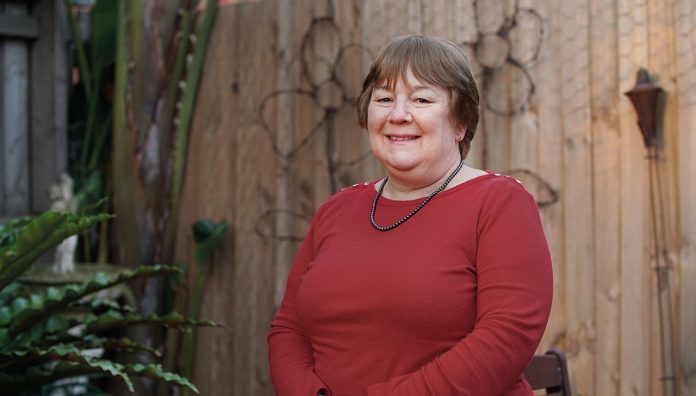An unswerving idealism and a drive to safeguard the mental health and physical wellbeing of her colleagues has earned Melbourne’s Kay Dunkley MPS the title of Symbion PSA Pharmacist of the Year.
A challenging initiation into pharmacy via the Neonatal Intensive Care Unit at Victoria’s Monash Medical Centre set Kay Dunkley on a career path that has spanned more than three decades.
‘It sounds gruesome, I know, but being involved in the regular neonatal mortality meetings for the medical and nursing staff, such a lot can be learnt through investigation of what contributed to a death,’ she says.
Positioned at the coalface of grief as a young adult, Ms Dunkley acquired an instinctive empathy for people dealing with trauma, loss and depression, including those within her own profession.
This led to her role as executive officer of the Pharmacists’ Support Service (PSS), which under her leadership over the past 15 years has grown from a fledgling single-state volunteer group to an essential nationwide counselling organisation.
Inspiring role models
Along the way Ms Dunkley expanded her mission to support healthcare workers in high-pressure and stressful workplaces, taking on the dual role as coordinator at the Australian Medical Association Victoria’s Doctor Wellbeing Program.
‘I fell into a career in pharmacy as a student who studied sciences and liked working with people, but I never had the desire to study medicine,’ she says.
‘The pharmacy profession has so many inspiring role models, and over my career I have been exposed to many of these wonderful people.’
They have all had a passion for pharmacy, she says, and are acutely aware of the broad scope of opportunities the profession provides to make a difference in the community.
Unprecedented demand
A wife and mother of two young adult children, Ms Dunkley spoke to Australian Pharmacist on the phone from her East Brighton home while in lockdown in Melbourne.
Apart from working long hours in isolation, she keeps busy building a new fox-proof chook pen in the family’s yard and watching the documentary series Emergency, set in the Royal Melbourne Hospital.
‘I keep watching, hoping that at least one episode will include a pharmacist,’ she laughs.
In times where it seems the entire country has at some point been in a state of emergency, the services provided by the PSS have never been more needed.
The real heroes
As bushfires swept through large swathes of the country early this year, PSS volunteers heard reports of pharmacists and pharmacy staff working without power or phone connections and refusing to take payment to ensure their communities had access to essential medicines.
‘There were pharmacists who slept in their cars as they could not travel out of bushfire affected areas, and others who organised delivery of medicines to areas via jet ski when there was no road access,’ she says.
‘There were those who attended evacuation centres to organise medication for people who had lost everything, and some of those pharmacy workers had lost their own homes and property in the fires.’
Then the pandemic hit. Pharmacy staff once more found themselves on the front line.
‘In my opinion these are the heroes of pharmacy who are all deserving of this award,’ Ms Dunkley says.
‘I hope that in some way I am accepting this award on their behalf.’
A prolific contributor in her field, she has spread research and experience across multiple platforms including journals, research publications, conference stands, webinars, lectures and on social media.
The dedication comes in part out of a frustration, Ms Dunkley says, because unlike doctors, pharmacists are rarely recognised as an at-risk group for poor mental health, despite the profession’s suicide rate being significantly higher than the national average.
She believes in the power of kindness and compassion in healthcare, not only for patients and customers but also for professional colleagues from other disciplines and one another.
What change in pharmacy in the past 2 years were you most excited about?
In the community pharmacy setting I am excited about electronic prescribing that will reduce a lot of paperwork and streamline the dispensing of medicines, as well as remove a lot of red tape and allow pharmacists to focus on clinical matters rather than clerical issues.
I am also pleased to see 24-hour pharmacy services becoming a reality both in hospitals and in community pharmacy as pharmacists provide essential services.
What action in PSA’s Pharmacists in 2023 report is the most important to be realised?
All 11 actions for change are important but you can’t achieve most of them without a pharmacy workforce that is well equipped to address Australia’s existing and emerging health challenges.



 Dr Peter Tenni[/caption]
Dr Peter Tenni[/caption]
 How should we deprescribe gabapentinoids, according to the Maudsley Deprescribing Guidelines[/caption]
How should we deprescribe gabapentinoids, according to the Maudsley Deprescribing Guidelines[/caption]



 Pharmacists have always prescribed, but they have the potential to prescribe much more
Pharmacists have always prescribed, but they have the potential to prescribe much more







